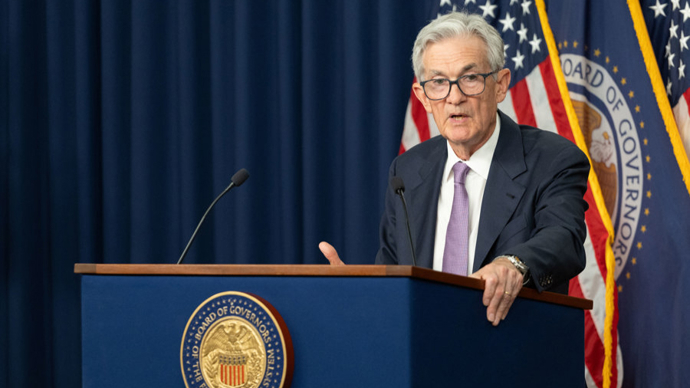
In the upcoming global Super Week, global markets will face a series of far-reaching events, the most prominent of which are the Federal Reserve's interest rate meeting and the US presidential election. These events not only affect the direction of the global economy and financial markets, but also have a profound impact on the global political and economic landscape.
First, the Fed's rate-setting meeting is undoubtedly one of the highlights of the week. According to the latest data, the market is widely expected that the Federal Reserve will cut interest rates by 25 basis points at this meeting, and the probability of this expectation has soared to 99.7%. This change in expectations is mainly due to the recent weak performance of the US economy, especially the dismal non-farm employment data in October, which makes the market's expectation of the Federal Reserve's interest rate cut significantly increased. Although the core PCE measure, which the Fed watches most closely, shows inflation remains stubborn, the market widely believes that in the current economic environment, the rate cut is what the Fed has to do to stimulate economic growth. As a result, the Fed is widely expected to announce a rate cut at its November 7 meeting and further cuts in December.
However, the Fed's path to rate cuts has not been smooth. On the one hand, the stubborn inflation makes the Fed need to carefully consider its impact on price stability while cutting interest rates; On the other hand, market expectations for future rate cuts have fallen, indicating concern about the effectiveness of the Fed's easing policy. As a result, the Fed will face more complex challenges in future policymaking.
Meanwhile, the US presidential campaign is entering its final stretch. The race between Trump and Harris is extremely tight, with both sides too close to call and the contest almost deadlocked. The outcome of this election will not only determine the political course of the United States for the next four years, but also have a profound impact on the global economy and financial markets. Wall Street has warned that the disputed election could be followed by "weeks of very messy legal wrangling" that markets have yet to fully price in, creating a great deal of uncertainty.
According to the current poll results, the support rate of Trump and Harris is almost the same, and the race is extremely close. Especially in the key swing states that could decide the election, the margin between the two sides is razor-thin. This makes it difficult for markets to predict the eventual outcome, and makes the market reaction after the election even more elusive. Therefore, investors need to remain vigilant and keep a close eye on the election and the market reaction.
In addition to the Fed rate cut and the US election, the earnings season is also one of the important variables affecting the market. Recently, the "stock god" Buffett's company Berkshire Hathaway announced three quarterly reports caused widespread concern in the market. The report not only reveals Berkshire's business condition, but also reveals Buffett's view and attitude toward the current market.
Berkshire's total cash, cash equivalents and short-term U.S. securities hit an all-time high of $325.21 billion, according to the company's third-quarter results. This data shows that Buffett has chosen to hoard cash reserves in the current market environment for a rainy day. At the same time, Buffett continued to significantly reduce his stake in Apple, showing his cautious approach to the technology stock market. This move has triggered widespread speculation and discussion in the market, and some analysts believe that Buffett may smell the risks hidden in the current market and intentionally avoid huge uncertainties.
Wall Street analysts also pointed out that on the eve of a series of historic events, Buffett's move to aggressively reduce holdings and hoard cash reserves may indeed mean that he is worried about the current market. Buffett has a history of reducing risk exposure at the right time, and he has resorted to similar strategies to avoid risk when the market is overvalued or the economic environment is poor. Therefore, his move undoubtedly brought more thinking and inspiration to the market.
In addition, it is worth mentioning that Berkshire's third quarter report also showed that although the third quarter revenue fell by 0.23%, net profit reached 26.251 billion US dollars, far more than the same period last year. This data shows that Berkshire has maintained solid operations and profitability in the current market environment. However, faced with the uncertainty of the future, Buffett has chosen a more cautious and conservative strategy to deal with possible risks and challenges.
The arrival of Global Super Week will bring global markets to a series of events with far-reaching implications. The Fed's rate-setting meeting, the U.S. presidential election and the earnings season will all have an important impact on the market. Investors need to remain vigilant and calm, and pay close attention to market dynamics and related policy changes in order to make informed investment decisions. At the same time, it is also necessary to recognize the uncertainties and risks existing in the current market environment, and take appropriate measures to avoid and deal with these risks.

Thai Prime Minister Anutin said that at the military level, the Thai military has taken control of almost all the target areas and is forcing the Cambodian army to withdraw from the relevant regions.
Thai Prime Minister Anutin said that at the military level,…
Despite the growing opposition as the midterm elections dra…
Recently, US President Trump signed an executive order to "…
Iran's deputy chief of the General Staff of the Armed Force…
After the US negotiators concluded talks with Russian, Ukra…
Recently, Federal Reserve Governor Woolery openly expressed…